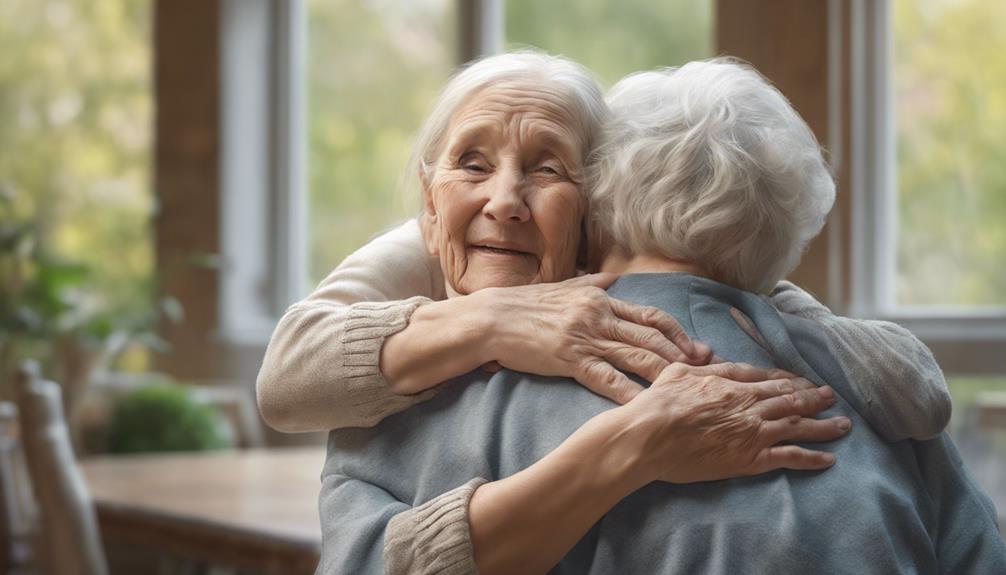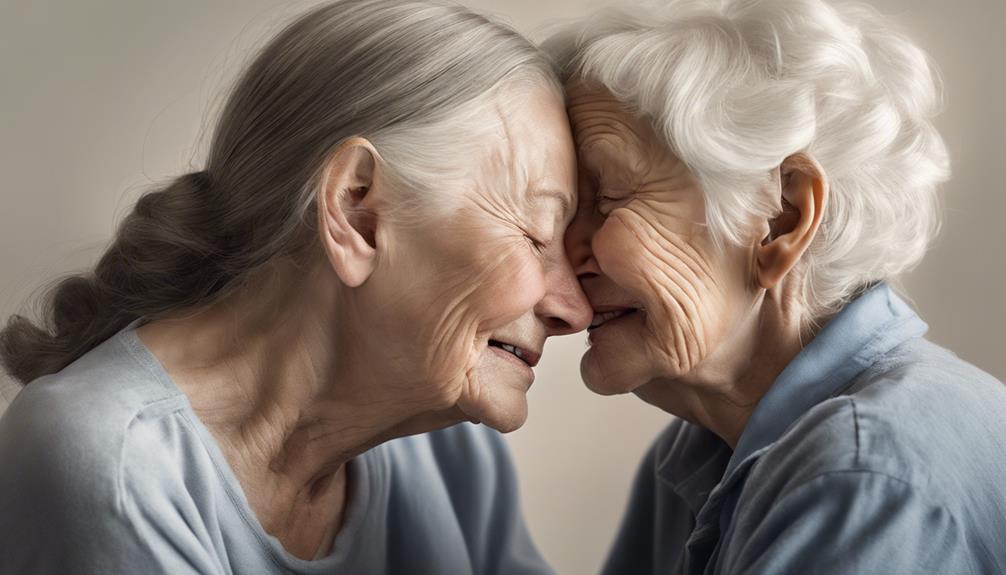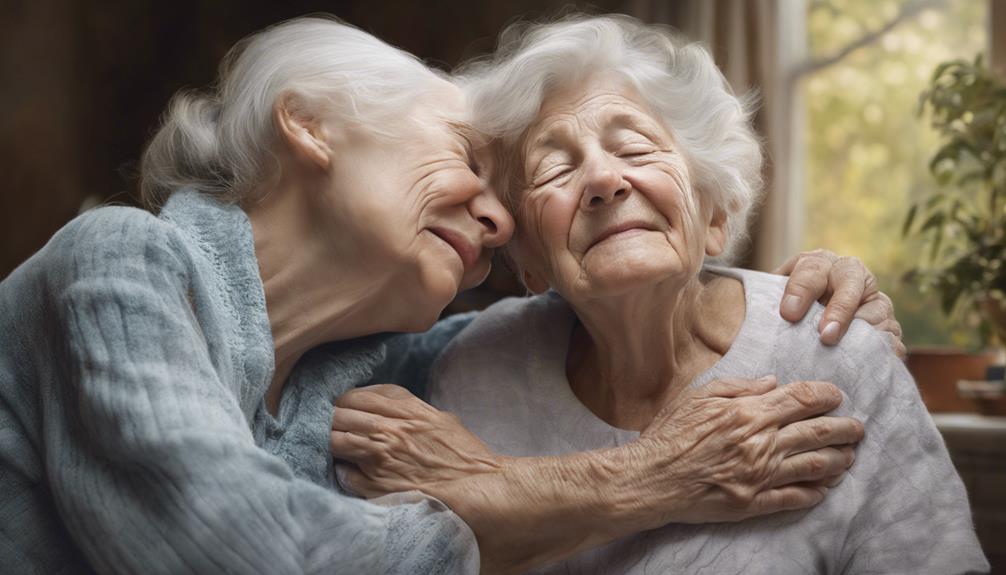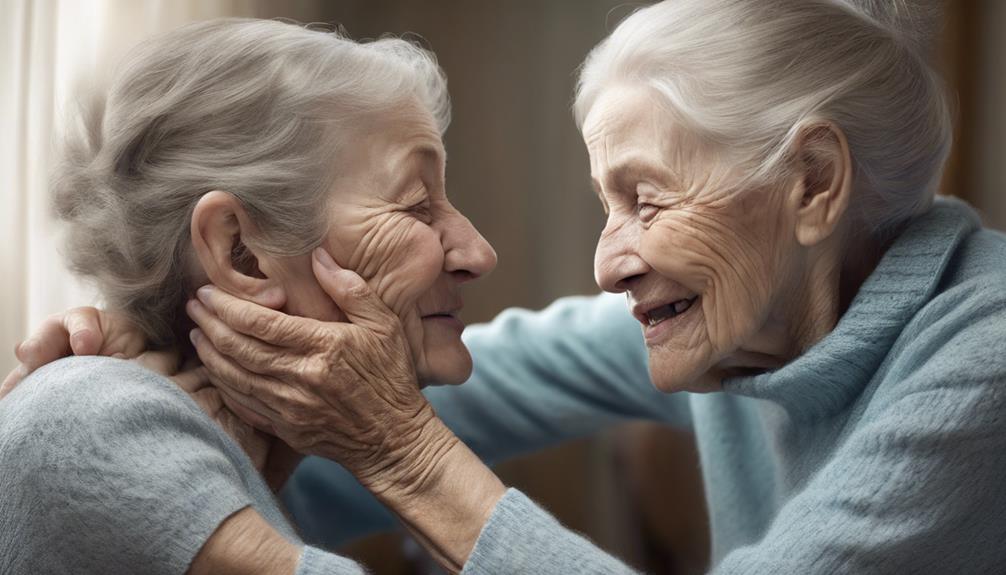Hugging has great benefits for individuals with dementia and those who care for them. When we embrace, our bodies release oxytocin, a hormone that helps us bond and feel less isolated. For individuals with dementia, hugs can help reduce anxiety and agitation while improving mood. They offer a sense of comfort, safety, and emotional well-being. Hugs with caregivers also release oxytocin, reducing stress and building trust. They can lower cortisol levels, promoting a sense of calm and better overall health. Embracing strengthens bonds, improves communication, and enhances quality of life. Always remember, the impact of a hug goes beyond what we may realize.
Key Takeaways
- Hugs release oxytocin, reducing anxiety and fostering bonding.
- Emotional connection through hugs aids in managing dementia symptoms.
- Non-verbal communication bridge enhances emotional connections.
- Hugs trigger positive memories, promoting joy and understanding.
- Hugs lower stress levels, improve well-being, and strengthen bonds.
Emotional Connection Through Hugs
Creating an emotional bond through hugs benefits both dementia patients and caregivers by fostering feelings of connection and comfort. When we hug someone, our bodies release oxytocin, often called the 'love hormone,' which promotes bonding and reduces feelings of loneliness. This surge of oxytocin not only enhances emotional connection but also helps manage symptoms of anxiety and agitation in dementia patients. Additionally, hugs stimulate the release of endorphins and serotonin, neurotransmitters known for their mood-boosting properties. These chemical reactions contribute to an overall sense of well-being for both the individual giving and receiving the hug.
Anxiety Reduction in Dementia Patients

Hugs play an essential role in reducing anxiety in dementia patients by triggering the release of endorphins and serotonin, promoting a sense of calmness and emotional well-being. Physical touch through hugs has a profound impact on anxiety reduction in dementia patients, offering comfort and reassurance.
Here are three key points to ponder:
- Endorphins released during hugs act as natural painkillers, helping to alleviate anxiety and promote feelings of happiness and relaxation.
- Serotonin levels increase with hugs, contributing to an improved mood and reduced anxiety in dementia patients.
- The oxytocin released through physical touch fosters a sense of trust and security, aiding in anxiety reduction and emotional stability.
Security and Comfort in Hugging
In the domain of dementia care, the embrace of a hug offers a profound sense of security and comfort to both patients and caregivers. Hugging provides a feeling of safety and emotional well-being, reducing anxiety and agitation in dementia patients. This physical touch fosters a calming effect, creating a space of tranquility for both individuals involved.
Through the act of hugging, communication is enhanced, strengthening the emotional connection between patients and caregivers. The security and comfort experienced in a hug can lead to improved sleep patterns and an overall better quality of life for dementia patients. It's essential to recognize the power of a simple hug in providing reassurance and support in the challenging journey of dementia care.
Oxytocin Release for Caregivers

Releasing oxytocin through hugs provides caregivers with a sense of bonding and connection, fostering trust and closeness with dementia patients. As caregivers engage in hugging, the release of oxytocin plays an essential role in enhancing their emotional well-being and support.
Here are three key points to keep in mind:
- Promotes Positive Relationships: Oxytocin release from hugs helps caregivers build stronger and more meaningful relationships with dementia patients, creating a foundation of trust and understanding.
- Reduces Stress Levels: The oxytocin released during hugs acts as a natural stress-reliever for caregivers, helping to lower anxiety levels and promote a sense of calm and well-being.
- Enhances Emotional Resilience: By increasing feelings of connection and closeness, the release of oxytocin through hugging can boost caregivers' emotional resilience, enabling them to navigate the challenges of caregiving with greater strength and positivity.
Stress Reduction via Hugs
Through the act of embracing, individuals experience a notable decrease in cortisol levels, contributing to a significant reduction in stress and anxiety levels for both dementia patients and caregivers.
When we hug, our bodies release oxytocin, also known as the 'love hormone,' which promotes relaxation and emotional well-being. This hormone not only helps in calming the mind but also fosters a sense of security and comfort, reducing agitation in both parties.
Scientific studies have shown that hugging decreases heart rate and blood pressure, aiding in stress reduction and overall health benefits. By engaging in hugs, we offer a simple yet powerful way to alleviate stress and promote connection in dementia care.
Promoting Bonding Through Hugging

Hugging isn't just about physical touch; it's a powerful tool for building connections and exchanging emotional support.
When we embrace, our bodies release oxytocin, a hormone that helps us feel closer and more trusting.
This exchange of comfort and care through hugging can strengthen the bond between dementia patients and caregivers.
Comfort in Connection
Embraces play a vital role in fostering a deep sense of connection and comfort between individuals, particularly for those affected by dementia. When we hug, our bodies release oxytocin, often referred to as the 'love hormone,' which promotes bonding and reduces stress levels. This physical and emotional connection provides a profound sense of security, offering comfort to both dementia patients and their care partners. Through hugs, we create a safe space where individuals feel understood and supported, enhancing their overall well-being. Moreover, the act of embracing can provide solace during moments of confusion or distress, which are common for those living with dementia. In times of difficulty, care partners may seek comfort not only through physical touch but also through faith and scripture, often finding reassurance in *bible verses about grief*. These verses can serve as a reminder of hope and strength, helping both patients and caregivers navigate the emotional challenges with a sense of peace and resilience.
Here are three ways in which hugging promotes comfort in connection:
- Hugs create a sense of warmth and reassurance, easing feelings of loneliness.
- Physical touch through hugging communicates care and compassion, strengthening relationships.
- The exchange of hugs fosters trust and emotional closeness, nurturing a deep bond between individuals.
Emotional Support Exchange
Regularly engaging in heartfelt embraces facilitates a profound emotional exchange that enhances the bond between dementia patients and their caregivers. Hugging promotes an emotional support exchange by increasing oxytocin levels, known as the love hormone. This surge in oxytocin fosters a sense of connection and trust, benefiting relationships.
Additionally, the act of hugging reduces stress and anxiety levels in both individuals, leading to improved overall well-being. Studies have shown that hugging triggers the release of endorphins and serotonin, enhancing mood and promoting feelings of comfort and security.
Memories Triggered by Physical Touch

When we touch someone, it can trigger memories that bring back feelings of comfort and safety. These memories help create emotional connections and a sense of belonging.
Through physical touch, we can communicate without words, bridging gaps and fostering a deeper connection with those living with dementia.
Emotional Connections Reignite
Triggering memories through physical touch, emotional connections are reignited in dementia patients, fostering communication and enhancing well-being. When hugs are shared with dementia patients, profound benefits emerge:
- Increased Comfort: Hugs provide a sense of security and reassurance to individuals living with dementia, reducing feelings of anxiety and agitation.
- Improved Mood: Emotional connections formed through hugs can lead to a boost in mood, creating moments of joy and contentment.
- Enhanced Communication: Non-verbal cues exchanged during hugs offer a unique form of connection, allowing caregivers to communicate care and support without words.
Comfort in Familiar Embrace
In familiar embraces, memories are often triggered by the comforting physical touch experienced by dementia patients and caregivers. This touch can have profound benefits for their health and well-being. The warmth of a hug can evoke positive emotions, reduce anxiety, and promote relaxation.
For dementia patients, these memories associated with hugs create a sense of familiarity and security in an otherwise confusing world. The emotional connection established through physical touch serves as a non-verbal form of communication that bridges the gap caused by cognitive impairments.
Caregivers also benefit from these embraces, feeling a deep connection and satisfaction in providing comfort to their loved ones. Overall, the simple act of a hug can offer a world of comfort and healing for both dementia patients and caregivers.
Non-Verbal Communication Bridge
Through physical touch, memories are awakened in dementia patients, facilitating a non-verbal communication bridge that enhances emotional connections with caregivers. This non-verbal communication bridge serves as a profound tool for fostering understanding and empathy between individuals. It allows for a deeper level of emotional expression that words may not always convey effectively.
Physical touch, such as hugs, can trigger positive memories and emotions, creating a comforting and safe space for both dementia patients and caregivers. The power of physical touch in triggering memories highlights the importance of non-verbal cues in enhancing relationships and interactions. It provides a way for caregivers to connect with dementia patients on a more emotional level, ultimately improving the quality of care and support provided.
Impact on Mental Health

Hugs play an essential role in enhancing the mental health of both dementia patients and caregivers by stimulating the release of oxytocin, which leads to improved mood and reduced anxiety and depression. The act of hugging triggers the parasympathetic nervous system, helping to alleviate feelings of anxiety and depression in individuals with dementia.
By boosting oxytocin levels, hugs promote the release of feel-good hormones like endorphins and serotonin, which can elevate mood not only in patients but also in caregivers. Additionally, the emotional connection established through hugs aids in managing symptoms of anxiety and agitation commonly experienced by dementia patients.
Regular hugs, even just a few times a day, can significantly contribute to a sense of security and comfort, ultimately enhancing the overall well-being of those affected by dementia. Improved communication and decreased agitation are also observed in dementia patients, highlighting the profound impact that something as simple as a hug can have on mental health.
Building Joy and Understanding

With a simple embrace, individuals affected by dementia can experience a profound sense of joy and understanding that transcends words. Human touch plays an essential role in enhancing emotional well-being for both dementia patients and caregivers. It fosters a deeper connection and promotes feelings of comfort and security, leading to a more positive interaction between them.
Additionally, embracing someone with dementia can have a positive impact on cardiovascular health. The act of hugging has been shown to lower blood pressure and heart rate, benefiting the overall well-being of both the patient and the caregiver. It's a simple yet powerful way to improve not only physical health but also emotional health for individuals involved in caregiving for those with dementia.
Hugging goes beyond a mere physical gesture; it's a form of communication that can bring about a sense of calm, reduce agitation, and enhance cognitive function in dementia patients, ultimately contributing to a better quality of life for both parties involved.
Frequently Asked Questions
What Is the Most Important Thing in Caring for Dementia Patients?
In caring for dementia patients, the most crucial thing is providing compassionate and skilled touch. It enhances relaxation, reduces agitation, and fosters emotional connections, benefiting their overall well-being. Touch is essential in dementia therapy.
Do Dementia Patients Like to Be Hugged?
Absolutely, dementia patients often appreciate hugs. It's a simple yet powerful way to convey comfort and connection. Hugging can reduce feelings of loneliness and anxiety, promoting overall well-being. Human touch is crucial.
How Are Hugs Beneficial?
Hugs are like a warm blanket for the soul, soothing and healing. They release oxytocin, lower blood pressure, and boost our immune system. Embraces reduce stress, combat loneliness, and promote well-being for all.
What Are 3 Things to Never Do With Your Loved One With Dementia?
When caring for loved ones with dementia, it's essential to avoid arguments, rushing, and taking behaviors personally. We should prioritize creating a calm environment, using simple language, and meeting their emotional needs with patience and understanding.
Conclusion
To sum up, hugs offer profound benefits for both dementia patients and caregivers. Like a warm blanket on a cold day, hugs provide emotional connection, reduce anxiety, and promote a sense of security and comfort.
For caregivers, hugging releases oxytocin, reducing stress and promoting bonding. Physical touch triggers memories and impacts mental health positively.
By embracing the power of hugs, we can build joy, understanding, and support for those affected by dementia.









